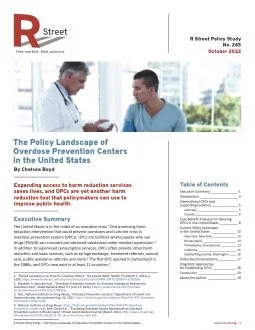By Chelsea Boyd
The United States is in the midst of an overdose crisis. One promising harm reduction intervention that could prevent overdoses and curb the crisis is overdose prevention centers (OPCs). OPCs are facilities where people who use drugs (PWUD) can consume pre-obtained substances under medical supervision. In addition to supervised consumption services, OPCs o昀琀en provide other harm reduction and basic services, such as syringe exchange, treatment referrals, wound care, public assistance referrals and more. The first OPC opened in Switzerland in the 1980s, and OPCs now exist in at least 11 countries Evidence supporting OPCs largely comes from the facilities operating in Canada and Australia. Evaluations of these centers have shown that they are remarkably effective at decreasing health harms associated with drug use, and there has never been a reported overdose death at an OPC. Additionally, OPCs have been shown to reduce syringe and consumption equipment sharing, decrease overdose deaths in the area around the center, prevent new HIV and hepatitis C infections, increase treatment uptake and decrease public injecting and syringe litter. Studies also have found that OPCs do not increase crime or drug use. Nevertheless, in both Canada and Australia, advocates who wanted to open the facilities faced uphill battles that left the OPCs in legal limbo for many years before ultimately receiving permanent legal authorization. The United States currently has two locally sanctioned OPCs in operation in New York City, and several states and cities are working toward opening OPCs despite their federally illegal status under the Controlled Substances Act (CSA). Although no jurisdiction other than New York City has opened an OPC in the United States, these centers have been authorized by policymakers at the state, county and local levels. In addition to New York City, Philadelphia, Seattle, Rhode Island and California have made progress toward authorizing OPCs. Policymakers at every level of government can take action to facilitate the opening of OPCs. Local policymakers and groups, such as mayors or city councils, can authorize OPCs, although this path provides the least protection from state or federal interference. States can pass legislation that authorizes OPCs through pilot programs, which allows them to be rigorously evaluated and ensures that an OPC’s existence does not conflict with state law. Nevertheless, federal action legitimizing OPCs is also necessary. Congress could consider amending the CSA to clarify that OPCs do not violate the act or stipulate that federal funds cannot be used to enforce the CSA in regard to OPCs. Alternatively, the administration could release a memorandum stating that the federal government will not interfere with OPCs operating under state or local authorization, or the Department of Justice could release a similar statement. The challenge with either of those actions is that future administrations could decide not to honor these statements. Regardless of how OPCs are authorized, policymakers can apply pragmatic approaches to authorize them in their jurisdictions. These include getting community buy-in, working with law enforcement, formalizing requirements for operation and evaluation and ensuring that the facilities and policies are designed to meet the needs of the populations they serve.
R Street Policy Study No. 265, Washington, DC: R Street, 2022. 19p.



